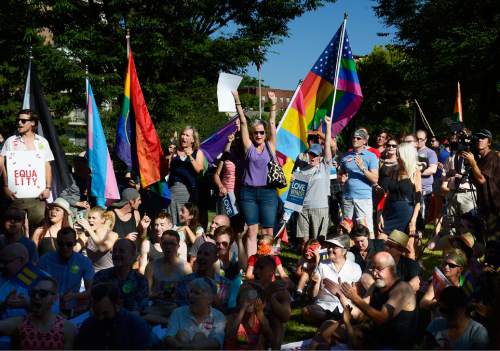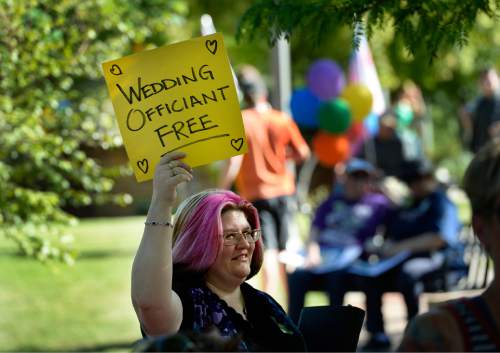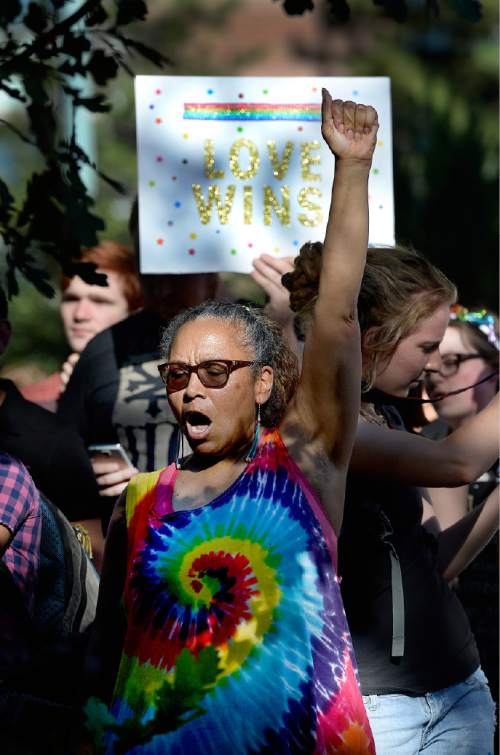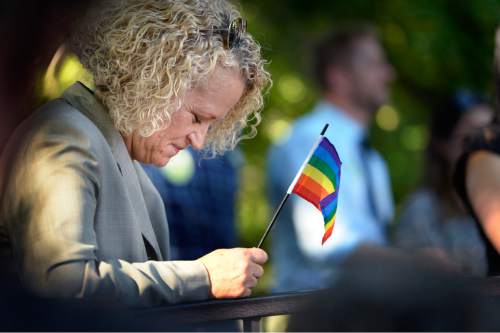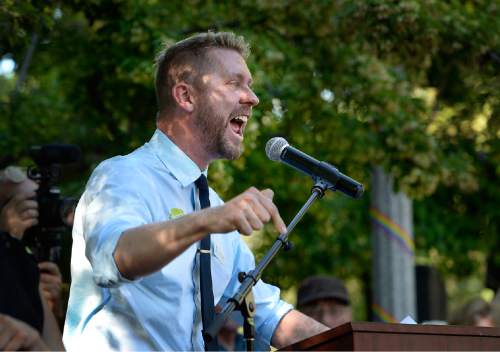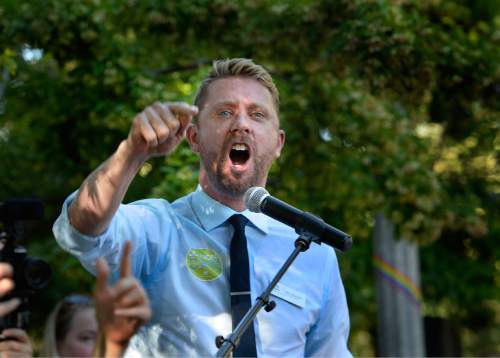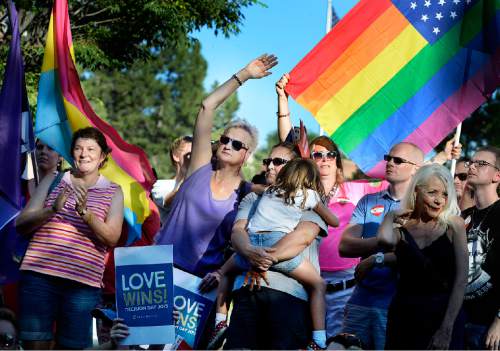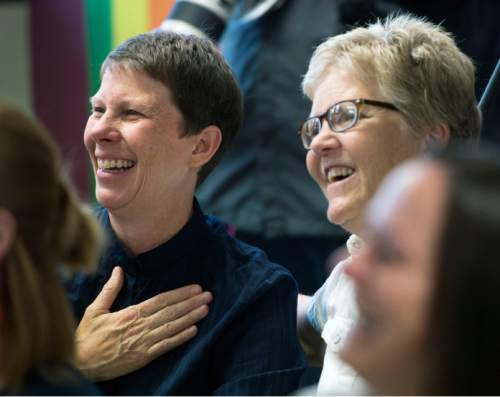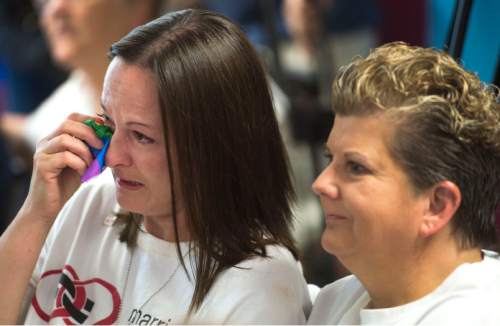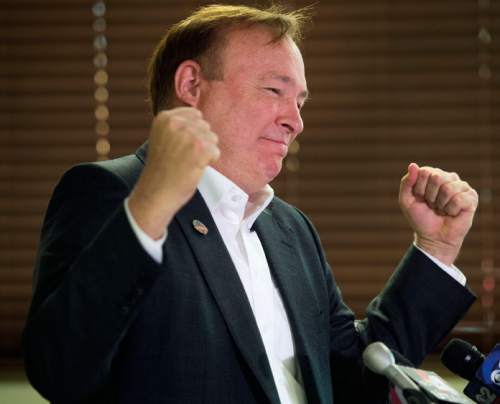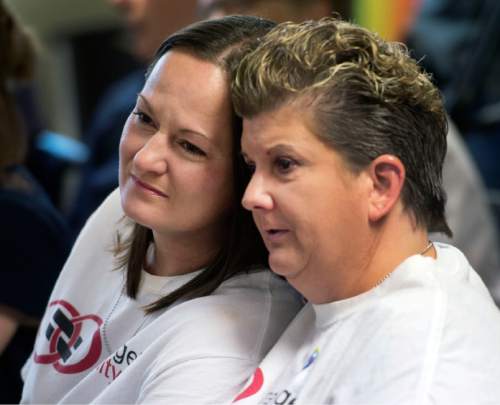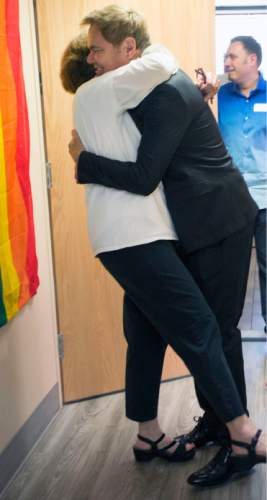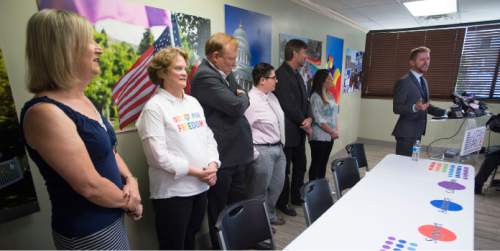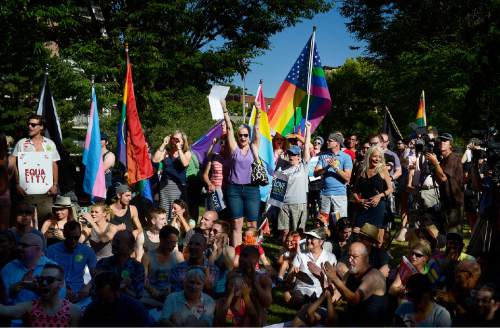This is an archived article that was published on sltrib.com in 2015, and information in the article may be outdated. It is provided only for personal research purposes and may not be reprinted.
Utah's gay and transgender activists embraced Friday's U.S. Supreme Court decision that legalized same-sex marriage in all 50 states with two words:
Love wins.
"And so does our country," Kent Frogley, board president of the Utah Pride Center said at a news conference hours after the decision was announced. "This ruling tells us at a constitutional level that we are protected at a fundamental level by the same ideas that our founders fought for, and it's a great day."
Before Friday, gay and lesbian couples already could marry in 36 states — including Utah — and the District of Columbia. With the ruling, the remaining 14 states, in the South and Midwest, will have to stop enforcing their bans on same-sex marriage.
Justice Anthony Kennedy wrote the majority opinion, just as he did in the court's previous three major gay-rights cases dating back to 1996. It came on the anniversary of two of those earlier decisions.
"No union is more profound than marriage," Kennedy wrote, joined by the court's four more liberal justices.
The stories of people asking for the right to marry, he added, "reveal that they seek not to denigrate marriage but rather to live their lives, or honor their spouses' memory, joined by its bond."
The 5-4 decision marks the culmination of two decades of litigation over marriage, and gay rights generally.
It's a moment in history that may have come sooner than many expected partly because of Utah's own same-sex marriage case, area attorneys said Friday.
Utah became the 18th state to legalize same-sex marriage on Dec. 20, 2013, when a federal judge struck down a voter-approved constitutional amendment that barred such unions.
The ruling in Kitchen v. Herbert from U.S. District Judge Robert Shelby — the first after the high court rejected the Defense of Marriage Act — was heavily cited in subsequent court cases. That helped to double in less than a year the number of states that allowed gay unions.
"Judge Shelby's decision quickly became the gold standard," said Paul Burke, an attorney who has represented the Pride Center and Equality Utah. "The plaintiffs in Kitchen identified the arguments from the DOMA case that led to Judge Shelby's decision and ultimately to the decision today."
Burke said Kennedy's opinion, which hinges on the principles of equal protection and fundamental liberties, mirrors Shelby's reasoning in Kitchen.
"I don't think the decision could be read as anything but a 100 percent endorsement of Judge Shelby's groundbreaking decision," Burke said.
Utah appealed Shelby's ruling, but lost on June 25, 2014, when the 10th U.S. Circuit Court of Appeals in Denver upheld his findings. That circuit court opinion is not the only one Kennedy cites, but is the only one quoted, noted University of Utah law professor Cliff Rosky, a member of Equality Utah's board of directors.
The reference comes in response to arguments that allowing same-sex couples to marry would lead to fewer opposite-sex marriages. Kennedy calls the conclusion "unrealistic" and points to Kitchen v. Herbert, where the appeals court said it was "wholly illogical to believe" state recognition of same-sex marriage would "alter the most intimate and personal decision of opposite-sex couples."
Shelby declined to comment Friday on Kennedy's ruling.
Rosky, who helped draft Utah's recently adopted gay and transgender nondiscrimination law, called Friday's outcome a resounding victory for the lesbian, gay, bisexual and transgender movement. "I would say this decision speeds the end of government discrimination against gay Americans."
Burke and Rosky said nothing in the ruling will force religions, including the Utah-based Church of Jesus Christ of Latter-day Saints, to abandon their beliefs or to marry same-sex couples.
Kennedy points specifically to the issue near the end of the 28-page opinion, saying that the "First Amendment ensures that religious organizations and persons are given proper protection as they seek to teach the principles that are so fulfilling and central to their lives and faiths."
Bill Duncan, director of the Lehi-based Marriage Law Foundation, disagrees and sees cause for concern.
"It has the effect of saying, [same-sex marriage] is the fundamental public policy of our country," Duncan said, "and anyone who just can't accept it is out of step."
That stance could threaten churches, he warned, when they intersect with government in some arenas such as tax exemptions.
Duncan said the ruling also strips away the rights of states, who were dealing with the marriage issue either through legislation or vote-driven constitutional amendments in ways that reflect their individual community standards and values.
"If you do this through legislation," he said, "there can be some horse trading. You can say, 'OK, I'll give you my vote on same-sex marriage, but you've got to ensure that my church-owned university housing, for example, won't have to rent to same-sex couples.' In this decision that all ends."
Duncan's view is echoed by the four dissenting justices, each of whom filed separate opinions. They agreed that states and their voters should have been left with the power to decide who can marry.
"This court is not a legislature. Whether same-sex marriage is a good idea should be of no concern to us," wrote Chief Justice John Roberts, who read a summary of his dissent from the bench for the first time.
"If you are among the many Americans — of whatever sexual orientation — who favor expanding same-sex marriage, by all means celebrate today's decision," Roberts said. "But do not celebrate the Constitution. It had nothing to do with it."
Gayle Ruzicka, president of Utah's Eagle Forum, agrees.
"It's a terrible thing that happened to our country," she said. "They shouldn't have ruled on it, but they turned it into a political issue and became super-legislators and changed the law. … We don't have a federal marriage license. It's a states' rights issue."
From the governor's office to the congressional delegation, Utah politicians also expressed disappointment with the decision. Most restated their support for man-woman marriage and for states' rights while expressing worries over the threat that such judicial rulings present for people of faith.
"The issue of same-sex marriage involves deeply held convictions on all sides of the debate," said Sen. Orrin Hatch, R-Utah, who helped write the 1993 Religious Freedom Restoration Act. "Now that the Supreme Court has spoken, I will do everything in my power to ensure that this decision does not infringe on important concerns such as our fundamental right to the free exercise of religion."
Utahn Bruce Bastian, who sits on the board of the Human Rights Campaign, the nation's largest gay and transgender rights group, said he believes much of the pushback from opponents of same-sex marriage comes from a groundless fear.
"I really don't think any of them have to be afraid of anyone in our community. We honor their marriages," he said. "There's no fight between same-sex marriages and opposite-sex marriages. None. It doesn't exist. That's a fabrication. We have won the right to join their ranks."
When the ruling came down Friday morning, Kitchen case plaintiffs Kody Partridge and Laurie Wood greeted the news with tears and said it eased the worry they'd felt in the days beforehand as they wondered if the justices might void their marriage and the unions of thousands of other gay couples nationwide.
"We had lots of discussions about how they could parse a decision and split the baby … and you know, thinking about it was just kind of a nightmare," said Partridge, who married Wood amid the throngs of Utah couples who wed after Shelby's 2013 decision. "But we are thrilled and we loved our part in it."
Wood said the dramatic shift in public opinion on the issue the past two years ultimately left her feeling hopeful that marriage equality would prevail.
"We know there will be some who say the U.S. Supreme Court just jumped ahead of states and legislatures," Wood said. "But really, it's the states that are falling behind. Public opinion is on the side of marriage equality and loving families."
The Associated Press contributed to this story.


